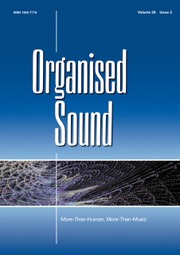Article contents
Auto-synthesis
Published online by Cambridge University Press: 15 August 2002
Abstract
This article attempts to place the dynamic of popular electronic music, evident since the late 1970s and extending to the current situation, at the forefront of developing both a strategy of critique and a medium for critical reflection. The genres covered include electronic music in and around the time of punk rock, subsequent moves to the forcing ground of pop music with the era of synth-pop, the dynamic upheavals created through the surging form of techno, up to the prevalent genres of micro-sound and electronica. The essence of both the body of critique formulated by the music, and the critical reflection of such critique (as developed in works when a genre of music is said to have ‘passed’) is not pinned to a rigid model of assessment. Instead, the strength of popular music's ability to strategise and conduct a critique is considered in the self-same music's ability to subvert the definition and ‘metric spaces’ of critique as accumulated through previous genres.
- Type
- Research Article
- Information
- Copyright
- © 2002 Cambridge University Press
- 1
- Cited by


